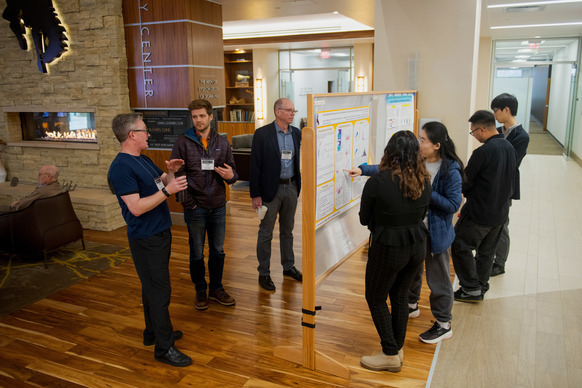Preparing for a Professional Conference
Published November 24, 2025
Preparing for a Professional Conference: Tips for Graduate Students

Speakers and poster presentations at the University Gateway Center.
Attending a professional conference is an exciting milestone in any graduate student’s journey—it’s where research meets real-world connection. Whether you’re presenting your work, networking with peers, or simply soaking up new ideas, preparation can make all the difference.
Know Your Conference Goals
Before you pack your bags, take a moment to clarify what you want to achieve. Are you there to present your research, seek collaborators, explore career opportunities, or learn about new trends in your discipline? Defining your goals helps you prioritize your time and approach the event with confidence and intention.
Work closely with your advisor, mentor, or committee chair as you prepare—they can offer invaluable insights about what to expect and how to present yourself professionally within your specific field.
The School of Graduate Education emphasizes the importance of goal-setting as part of professional development: having a clear sense of purpose helps you turn conference experiences into meaningful career momentum.
Perfect Your Presentation
If you’re presenting, practice early and often. Tailor your talk or poster to a broad academic audience—clear, concise, and visually engaging. Rehearse explaining your research in both technical and accessible terms, and time yourself to stay within limits. Need a little extra support communicating your message? Visit the Oral Communication Center for support.
Be sure to time your presentation and rehearse your delivery with peers or mentors. Need support? Visit the University Writting Center to refine your abstract, slides, or speaking points.
Polish Your Professional Materials
A professional conference is as much about connection as it is about content—so bring materials that reflect your best self.
- Update your résumé or CV to include your latest projects, teaching, and publications.
- Bring business cards or a digital contact card to share easily.
- Refresh your LinkedIn profile, making sure your headline and “About” section highlight your graduate research and interests.
You can even print polished materials at the Copy and Print Center. before you go. For a networking refresher, check out LinkedIn Learning on communication, professional branding, and networking strategy.
Plan Your Schedule
Review the conference agenda ahead of time. Identify key sessions, workshops, or speakers aligned with your interests. Leave space for spontaneous conversations—often, the best connections happen in hallways or after sessions.
Network Authentically
Approach networking as relationship building, not self-promotion. Ask questions, listen actively, and show genuine interest in others’ work. Don’t forget to follow up afterward with a quick email to keep the connection alive. Join a student group or networking event to connect with fellow graduate students.
Take Care of Yourself
Conferences can be intense—long days, lots of talking, and new environments. Stay hydrated, get enough rest, and schedule quiet moments to recharge. The Wellness Center offers great strategies for maintaining balance during busy academic seasons.
Reflect
After the conference, take time to summarize what you learned and identify next steps. Update your advisor, lab group, or department newsletter with highlights and lessons—it’s a great way to share insights and build your professional presence.
Whether it’s your first or fifth conference, a little preparation goes a long way in making the experience meaningful, productive, and energizing. Show up prepared, stay curious, and let your passion for your work shine.

